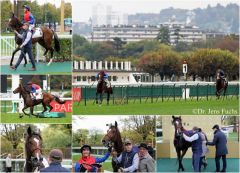Breeding & Racing in Germany
In order to be of assistance to our growing number of readers from abroad, we are with immediate effect publishing in every issue of Turf Times an English page, giving in compact form all the latest racing and breeding news from Germany in English.
When we introduced “The English page” in Turf Times a few years ago, there was no question about the author. Our English readers could not be better informed about what was happening here than by David Conolly-Smith. Born in Nottingham, the Englishman, correspondent for various British and Irish specialist newspapers, German representative of the International Racing Bureau, contact point for all active people from the island, lived in Munich and horse racing was his passion. He passed away on July 9, 2023 at the age of 83. It was his wish that Shannon Patricia Spratter should continue the English-language column in his place. He was friends with her father, the Irish-born trainer John David hillis, wo is working in Munich, and the apple doesn't fall far from the tree. Our columnist briefly introduces herself here.
 Writes the column for the English-speaking Turf Times readers: Shannon Spratter with her father, former jockey and current gallop trainer, John David Hillis. Foto: privat
Writes the column for the English-speaking Turf Times readers: Shannon Spratter with her father, former jockey and current gallop trainer, John David Hillis. Foto: privat
My name is Shannon Patricia Spratter and I was born into racing through my father, former jockey and now trainer, John David Hillis and mother, Jeanette Spratter.
Due to the recommendation of David Conolly-Smith, I have taken over his part with great enthusiasm and now write the English edition about our German racing.
When I'm not in front of the computer writing texts or pursuing my main job, I spend my time at my father's racing stable. My favourite hobby is riding races as an amateur.
Following the publication last week of the International Classifications, we now have this week the publication of the German Free Handicap (Generalausgleich or GAG for short). While the former weights are in pounds (i.e. 454 grams), the latter are in kilos, but it is fairly simple to convert, and in any case the horses listed internationally are given the same (converted) ratings in their home countries.
weiterlesen »The International Classifications were published this week, and on the whole they make depressing reading, both from a general point of view and also from a German perspective. The idea that thoroughbred performance, as measured by these ratings, is continually improving is certainly disproved. The ratings on the whole are the lowest for many years and this is particularly true of the world´s three-year-olds in 2019. Classic form in almost all major racing countries was relatively poor in relation to previous years.
weiterlesen »Last weekend´s Irish Stallion Trail was by all accounts a big success despite horrible weather. Just about every Irish stud of note took part, from Coolmore to the Irish National Stud. This weekend sees the Route des Etalons de Normandie, also over two days, with 30 studs taking part and almost 100 stallions parading.
It is difficult to imagine such an event in Germany, although the “Tag des Gestüte” (Stud Open Day) in mid-September is very popular and 13 studs took part last year. Put simply, the quality here is good, but the quantity not enough, and also the distances are too great; there are major studs in Germany next to the Polish border (Görlsdorf) and others within sight of the Alps (Ammerland). Although most of the top stallions stand in the Rhine valley, or close to is, that also extends from the Dutch border down to Switzerland. And at the last count here are only 47 thoroughbred stallions standing in Germany, less than half the number in Normandy alone.
weiterlesen »The Direktorium, the German racing authority, this week published statistics on the German racing and breeding industry for 2019, and they show clearly that both industries have shrunk alarmingly this century. The peak period was in the mid-1990s, after the reunification of Germany in 1990, and throughout the 1990s racing was booming, but a clear decline set in after the turn of the century. There are various reasons for this, including the rise of internet betting and the huge increase in sports betting (which was previously illegal in Germany), both of which caused a dramatic reduction in tote on course betting turnover, one of the main financial pillars which paid for much of the racing here.
weiterlesen »Our remarks in this column last week about problems at Neuss have been overtaken by events, and it now looks as if the fixture there on December 8th will go down in history as the last ever in the 144 years of the racetrack. The Neuss town council, which owns the property, gave the race club (Neusser Reiter- und Rennverein) notice a year ago that their lease would not be renewed at the end of 2019 and have now confirmed this. The whole area was redeveloped by the town ten years ago and named Rennbahn-Park, but racing was almost a minor part of the activities staged there, which include an open air theatre with a highly regarded summer Shakespeare Festival. The race club has cancelled its scheduled meeting for this Sunday, and also its five meetings listed in early 2020. These meetings have all been transferred to Germany´s other sand track used for winter racing at Dortmund, with one exception, when Dortmund is not available for non-racing reasons.
weiterlesen »The German fixture list for 2020 comprises 151 race days, 88 of which are on a Sunday and a great many more on public holidays such as Easter Monday. Midweek racing is now quite rare apart from the week long meetings at Hamburg and Baden-Baden, while most racecourses avoid Saturday racing like the plague, except for those in the former GDR and again Hamburg and Baden-Baden. In all 32 racecourses are listed. Dortmund, which races both in the summer (on turf) and in the winter (on sand) has the most racing, with 14 days scheduled, while nine more have seven or more race days. No fewer than twelve tracks race only once a year; these are small country racecourses who can count on a lot of local support.
weiterlesen »The main problem of the German racing and breeding industries at the moment is the way that the whole industry has shrunk this century. The Direktorium this week published the fixture list for 2020, which comprises 151 race days, almost all of them on a Sunday or Bank Holiday. Except for the week long meetings at Hamburg and Baden-Baden, there is now virtually no racing on Saturdays (dominated by football for ten months of the year) or midweek. This is the lowest number of race days for many years, and compares to a high of 325 in 1995. This of course reflects the number of horses in training, now about 2,400 compared to over 5,000 in the late 1990s.
weiterlesen »There has been no racing in Germany for the past week, and we have only six more racedays to come this year. Five of these are on the winter sand tracks at Dortmund and Neuss and one, weather permitting, on turf at Mülheim on Boxing Day. All of these meetings have an early start, usually before 11 a.m. because they are to be shown on Equidia, the French racing channel, for French punters to bet on, and are heavily subsidized by the PMU. The French need races in the mornings, and as they are putting up most of the money they also dictate these rather unsocial times; he who pays the piper calls the tune. On the whole these races, and also the prize-money on offer, are at a very low level, so they are unlikely to have much impact on the German 2019 statistics.
weiterlesen »Owing to various religious holidays, during which gambling is forbidden, Germany has only one day´s racing in the second half of November and that took place on the Wednesday of this week at Dresden. The fixture, traditionally held on Atonement Day, is the penultimate turf meeting of the year in Germany, we now have only Boxing Day (weather permitting) at Mülheim to look forward to, as the racing on the sand tracks at Neuss and Dortmund is, with all due respect, not very inspiring.
weiterlesen »The season is coming to an end, and last Sunday´s Group Three Grosser Preis von Bamberg – Herzog von Ratibor-Rennen was the last group race of the German season and in the meantime the last European group races have also been run. The Ratibor-Rennen, as it is usually known, is an important late season race for two-year-olds and has often been won by top juveniles who went on to major success the following season, such as subsequent German Derby winner Pastorius (Soldier Hollow) in 2011. Pastorius, now standing as a stallion in France, had a runner in last Sunday´s race, the filly Nona, but she dropped out after leading to halfway.
weiterlesen »Hungary has played quite a strong role in the history of thoroughbred racing, but this mainly refers to events that took place some 150 years ago. However in the postwar period we can find the Hungarian champion Imperial (Hurry), who won their Derby in 1963 and also won the Hansa-Preis at Hamburg (in those a much more significant race than it is now) in 1964. He can be found in many top pedigrees today, usually in the fifth or sixth generation, as the sire of the Gestüt Röttgen-bred Prince Ippi. winner of Group One races in 1972/3. In a lengthy stud career at Röttgen Prince Ippi managed to sire two champions – Philipo, the German Derby winner in 1986, and much more importantly the filly Anna Paola, winner of the Preis des Winterfavoriten in 1980 and the Preis der Diana the following year.
weiterlesen »There was some interesting racing at Hanover last weekend, but from the German point of view the Group One Criterium International at ParisLongchamp was the event that was most important, as it was won by Gestüt Schlenderhan´s homebred Alson (Areion), the first German-trained Group One winner abroad since the Andreas Wöhler-trained Potemkin (New Approach) won the Premio Roma (since demoted to Group Two) in 2016. In the early years of this decade we had several German horses scoring at the top level – for example Danedream in the Arc and King George, Novellist also in the King George, Pastorius in the Ganay and Protectionist in the Melbourne Cup – but since then this stream of Group One winners has dried up. This result was therefore very significant, and of course a great success for Schlenderhan and especially for trainer Jean-Pierre Carvalho.
weiterlesen »








